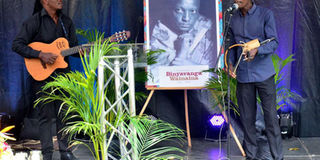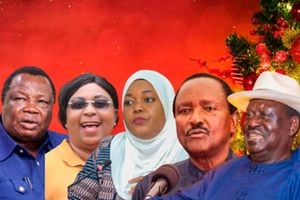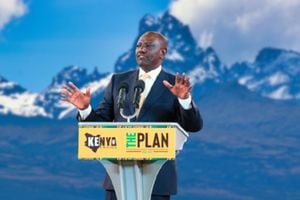How Binyavanga Wainaina got me into writing this weekly column 5 years ago

Guitarist Eddie Grey (left) and Boaz on the nyatiti perform during a memorial service for author Binyavanga Wainaina at the National Museums of Kenya in Nairobi on May 30, 2019. PHOTO | FRANCIS NDERITU | NATION MEDIA GROUP
What you need to know:
- As Wainaina bows off the stage, two of the most acclaimed East African writers, internationally, today are Ugandan Jennifer Nansubuga Makumbi and Kenyan Yvonne Adhiambo Owuor.
They are both patently, and by their own grateful admission, “products” of Kwani? and Wainaina’s own personal interaction with them.
- Indeed, both my copies of Kintu, Makumbi’s epic tale that won her the US $165,00 (Sh16.5m) Campbell Prize last year, are of the original Kwani? Trust edition.
Kwani (you mean) you hadn’t heard of his death?” This is what many of you have been asking since you noticed that I had not mentioned Binyavanga Wainaina in my column. I certainly had not heard, as our colleague expired late on Tuesday night and I did not get the tragic news until Wednesday morning, long after I had filed my story.
PERSONAL THINGS
I had, however, coincidentally mentioned the Kwani Trust, in connection with Jennifer Makumbi, who had just launched her new book, Manchester Happened, in Nairobi before proceeding to Kampala’s International Writers Conference. We will return to the connection presently.
I will not mourn Binyavanga Wainaina, or even eulogise him in the conventional way, for a number of reasons. First, I did not know him well. Secondly, there has already been an impressive array of tributes paid to Wainaina. Thirdly, I was only last week shedding tears, in this very column, over our little sister, Wakini Kuria, who had abruptly departed from us at the tender age of twenty-six.
I will thus only celebrate Binyavanga Wainaina by dwelling on the few little personal things that I found particularly attractive about him. These, as you will note, are values that I hold dear and I keep talking about on these pages. These are my East African love, my gender equity passion and a serious and active commitment to literature and culture.
I read somewhere that Wainaina’s mother was a Ugandan lady who ran a beauty salon in Nakuru. Yet the name Binyavanga is recognisably Rwandese. We need not go into genealogies here, especially since we already know that the Ugandan Constitution recognises as citizens Burundians and Rwandese within its borders. But the point is that Binyavanga Wainaina represents for me the African of the present and the future, at home everywhere and anywhere within this brave new borderless continent. Indeed, Wainaina was a Panafricanist, and he had expressed a desire to settle and live in his other country, South Africa.
DAZZLINGLY BRILLIANT
Regarding his infectious commitment to literature, I was startled, on reflection, at how instrumental he was in what I am doing right now. Back in early May 2014, I attended a literary evening at the Louis Leakey Memorial Auditorium, at the National Museums of Kenya, where Binyavanga Wainaina was hosting the eminent Somali novelist Nuruddin Farah. Farah, my former colleague at Makerere, talked eloquently and endearingly about his life and work both in Somalia and in his prolonged exile.
At the end of that session, Julius Sigei, then a young editor from the NMG, asked me if I, too, wanted to write a memoir, share my story, as Farah had done. I laughed and asked Julius, “Is there a story in me?” This question is today the working title of my life story, which I hope will soon see the light of day.
Julius’ answer to my question, however, was that you never know. He suggested that I could start by writing a few articles for the paper. I found that attractive, and I hesitantly embarked on the assignment. The rest, as you can see, is this now five-year old weekly chat of ours.
I do not know what role Wainaina had played in organising that event at Museum Hill. But his hosting and moderating of it obviously played a significant role in getting me to write for the media, as I am doing now. Indeed, without wanting to eclipse Wainaina’s dazzlingly brilliant creative writing, I agree with the opinion that his strongest contribution to East African literature was his “activism”.
This meant his determination to make literature “happen” and to make people notice it and talk about it. Is this not what his Kwani?, first the magazine and later the Trust, which he set up with his own Caine Prize money, are all about?
KWANINI? SERIES
I heard that Binyavanga Wainaina abandoned his Bachelor of Education degree course at KU. Could he have walked out of my own beloved “Literary Theory” class? If he did, I would yell out an enthusiastic “Bravo!” to him, posthumously. It is definitely and infinitely more important to make literature than to talk about it.
As Wainaina bows off the stage, two of the most acclaimed East African writers, internationally, today are Ugandan Jennifer Nansubuga Makumbi and Kenyan Yvonne Adhiambo Owuor. They are both patently, and by their own grateful admission, “products” of Kwani? and Wainaina’s own personal interaction with them. Indeed, both my copies of Kintu, Makumbi’s epic tale that won her the US $165,00 (Sh16.5m) Campbell Prize last year, are of the original Kwani? Trust edition, which declares on its back cover that it is “proudly Kenyan”.
I also noticed that Kwani? has an arrangement, the Kwanini? Series, under which several international titles are made locally available. Among these I particularly noted nearly all the works of Chimamanda Ngozi Adichie. Need I say more? It is no longer an exaggeration to say that Adichie is the Chinua Achebe of her generation. How did Wainaina and his Kwani? manage to get into working relationships with all these great and mighty personalities of literature?
MUTUAL APPRECIATION
I think that his success lay in his love for literature and the people who worked in and on it. Incidentally, have you noticed that the three big literary names I have just mentioned are those of women? The wish may be father to the thought here, but I believe that one of the reasons why Binyavanga Wainaina succeeded remarkably with women writers is that he loved them.
I will leave it to the sisters who worked with him to enlighten us on this. I only wish the reader to understand that the love I am talking about is the genuine mutual appreciation, trust and respect with which people, and especially colleagues, should interact with one another, with no ulterior motives.
Brave, brutally honest, indefatigable literary warrior, Wainaina was a truly many-splendored rainbow.





